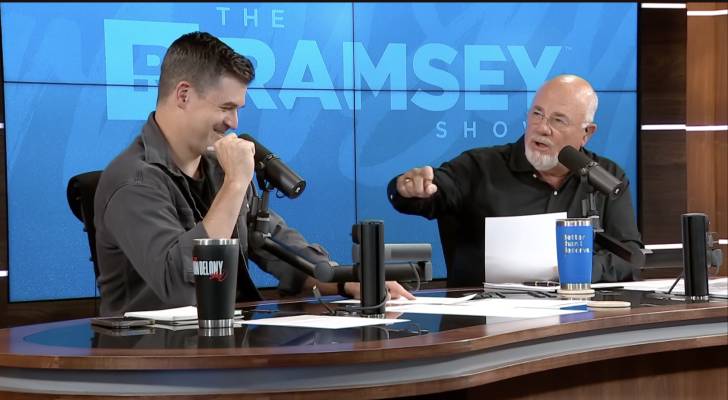Molly from Minnesota sent in a question to The Ramsey Show that prompted Dave Ramsey to give this blunt assessment: “You’re screwed” (1).
Molly’s dilemma? She bought a house with her partner, but she made the full down payment. She said her partner shares the monthly payments, but “hasn’t said anything about paying me back for half the money I put down.”
She asked if she should get her partner to take out a home equity line of credit (HELOC) to pay her back.
Before he finished reading Molly’s question, Ramsey Show co-host John Delony said, “Just break up and sell the house and move on.”
“You telling him to take out a HELOC that he has to pay back actually puts your house at risk. Don’t do that. That’s silly. The bigger issue here is y’all have some major fractures in your relationship,” Delony said. “You should have addressed them before you entered into a legal, binding contract.”
Ramsey is equally tough in his answer. He identified “only two ways you will survive this”: Getting married or selling the house.
A HELOC (home equity line of credit) is a way to borrow money against the equity that you have in your home. Equity is the difference between the value of your home and what you owe on your mortgage.
A HELOC is a loan that uses your home as collateral. The risk of this loan is that if you default, your home can be taken to repay your debt. You also must pay interest and fees on a HELOC (2).
The Ramsey Show co-hosts advised Molly that her plan to ask her partner to take out a HELOC is not wise, though they did not go in-depth on why. Their focus was instead on why it isn’t, in their opinion, a good idea to buy a home with your partner unless you are married.
“You have no out when it goes sideways,” Ramsey said.
Ramsey told the story of a previous caller to his show who had purchased a house with a partner she was not married to, who then died in a car accident. The caller then was in a situation where her deceased partner’s mother inherited half of the house.
He also questioned what would happen if Molly’s partner simply left; Ramsey said she might be stuck with the house and unable to sell it if his name was on the deed.
Story Continues
Trending: Are you richer than you think? Here are 5 clear signs you’re punching way above the average American’s wealth
Molly did not state whether her partner was on the title and deed to the home. She also did not say whether they had drawn up a cohabitation agreement. A cohabitation agreement is akin to a prenuptial agreement, but for couples who are not married.
It can include stipulations about what will happen to your shared assets, property, children or pets, if one partner dies or the relationship ends. Laws on co-habitation vary by state, and such agreements are not enforceable in Mississippi or North Carolina. So if you are considering living with your partner, or making another big mutual decision like buying property or having children, you can look into the laws around co-habitation agreements in your state (3).
Ramsey is convinced, though, that given the question Molly has asked, she and her partner have not sought any legal advice about their shared ownership of their home.
“You people aren’t real good about doing paperwork on stuff, I can tell,” he said.
Ramsey said buying a house without being married is “a complete never.”
For Molly, Ramsey suggests marriage as an option because “At least when there’s a divorce … there’s a legal mechanism for getting rid of this stupid house.”
While Ramsey is convinced that marriage is the only contract strong enough to protect both parties when it comes to owning a home, there are other legal options for couples who want to share assets, but do not want to get married.
If you want to share a home, or hold joint accounts with your partner, investigate what the laws are in your state, and consider speaking to a legal expert about how you can take these steps in your relationship while also protecting your assets. Buying a home is likely the largest financial decision you’ll ever make in your life, so it makes sense to have a legal agreement in place with your partner if you do not have the built-in agreement that applies if you are married.
It may feel unromantic or scary to talk about what would happen to shared assets if your relationship ended, whether because of a breakup, or a death — but it’s a conversation that is worth having. You wouldn’t get married without talking about it first, so it makes sense to have an in-depth discussion about something as significant as buying a home.
Join 200,000+ readers and get Moneywise’s best stories and exclusive interviews first — clear insights curated and delivered weekly. Subscribe now.
We rely only on vetted sources and credible third-party reporting. For details, see our editorial ethics and guidelines.
Ramsey Show highlights (1); FTC (2); FindLaw (3)
This article provides information only and should not be construed as advice. It is provided without warranty of any kind.

